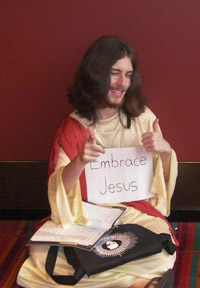Came across a
blog post this morning that got me thinking. The topic was the use of titles –
in this case whether or not pastors should be referred to as, well…pastor. The
author, Mike Foster of Deadly Viper, states:
“My
basic point is that I think this whole title thing is stupid. And set up
unhealthy situations. In many ways titles can feed a culture of ego, celebrity,
and power. I also think it promotes a system that sets a leader above others.
Many
will say calling someone pastor/doctor/etc. it is a term of respect. But we
live in a world where respect is earned, not simply given because you have a
certain position or title.”
As I thought
about this post (less the question of pastor-or-no-pastor and more about titles
and respect) I was particularly struck by the statement that “we live in world
where respect is earned, not simply given because you have a certain position
or title.”
Mike’s statement (I do not know him, but assume from his post that I can call him Mike) hits on a key ongoing shift in American culture in the extent to which followers perceive the distance between themselves and their leaders. This phenomenon, also known as power distance, can have serious implications for how we communicate with and understand (or fail to communicate and understand) one another across generations and across continents.
The important thing to remember is that there is no single “right” power distance. There are just the perceptions of followers and leaders and how they interact with one another. Do high distance cultures – where followers perceive a large distance between themselves and their leaders – create dangers of dictatorships and abuse? Absolutely. But excess in the other direction – say the parent who says nothing when their teen curses at them – has potentially negative societal implications as well.
So what do you think? Should the press corps call the president Barack? Should my undergraduate students call me Joan? Should I call my students Mr. Smith or Miss Jones? Do adults need to earn the respect of children before expecting them to listen? What about the police?

